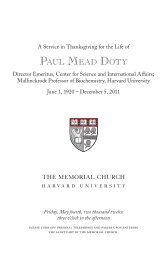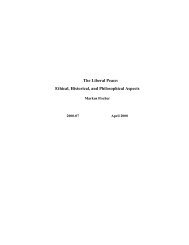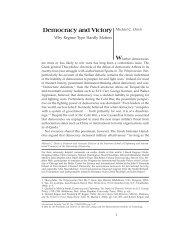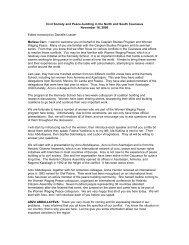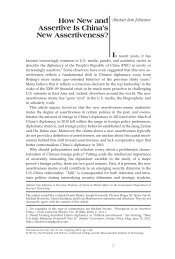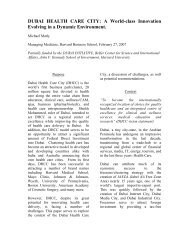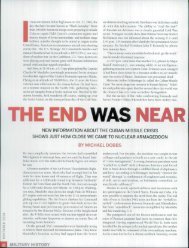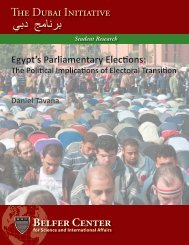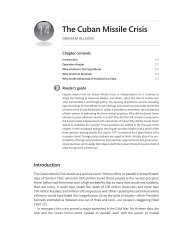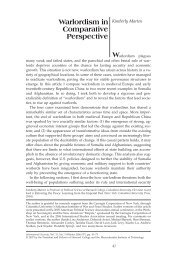The Cuban missile crisis and intelligence performance
The Cuban missile crisis and intelligence performance
The Cuban missile crisis and intelligence performance
Create successful ePaper yourself
Turn your PDF publications into a flip-book with our unique Google optimized e-Paper software.
Downloaded by [Harvard College] at 08:23 18 September 2012<br />
200 INTELLIGENCE AND THE CUBAN MISSILE CRISIS<br />
American <strong>intelligence</strong> to begin with, in view of its technical inferiority <strong>and</strong><br />
the acute challenges it faced by virtue of the structural <strong>and</strong> domestic<br />
political circumstances under which it operated (as Wirtz discusses at<br />
length). Nevertheless, even when measured against a lower st<strong>and</strong>ard of<br />
reasonable expectations, Soviet <strong>intelligence</strong> hardly acquitted itself well. We<br />
may say in its defense, however, that while it had great difficulty being<br />
relevant, at least it cannot be held responsible for disastrous policy.<br />
We cannot hold <strong>Cuban</strong> <strong>intelligence</strong> up to a st<strong>and</strong>ard of <strong>performance</strong><br />
appropriate either to American or Soviet <strong>intelligence</strong>. It was a nascent<br />
community operating under severe technical <strong>and</strong> resource constraints.<br />
Moreover, the <strong>Cuban</strong> leadership was clearly selective in what questions it<br />
asked its <strong>intelligence</strong> community, how it listened, <strong>and</strong> how it used<br />
<strong>intelligence</strong>. Amuchastegui's account suggests that most of the pathologies<br />
evident in the <strong>Cuban</strong> <strong>intelligence</strong>-policy relationship lay on the policy side.<br />
Nevertheless, as Amuchastegui makes clear, <strong>Cuban</strong> <strong>intelligence</strong> did make<br />
mistakes. <strong>The</strong>y were not, however, mistakes of the kind that would<br />
encourage faulty policy, <strong>and</strong> Amuchastegui's tale indicates to us that <strong>Cuban</strong><br />
<strong>intelligence</strong> had a remarkably mature demeanor throughout the episode in<br />
question. It was circumspect, relatively open-minded, <strong>and</strong> acutely aware of<br />
the structural <strong>and</strong> domestic political challenges it faced. In professionalism,<br />
it certainly compared favorably with the KGB.<br />
Evaluating the <strong>performance</strong> of an <strong>intelligence</strong> community in this way -<br />
rather than focusing intently on specific spectacular judgments (usually<br />
misjudgments), second-guessing analysts with the benefit of hindsight, or<br />
attempting to gauge a rate of success - has, we believe, at least four merits.<br />
First, it forces us to factor into our evaluations some baseline expectation of<br />
<strong>performance</strong>. Clearly <strong>intelligence</strong> communities differ from each other in<br />
raw capability <strong>and</strong> the challenges they face. Simply counting successes <strong>and</strong><br />
failures - even if we could do it meaningfully - could tell us nothing about<br />
how well they are doing relative to each other. But at least we can determine<br />
roughly how well an <strong>intelligence</strong> community is doing relative to its own<br />
<strong>performance</strong> in the past when we begin by trying to establish a reasonable<br />
expectation. Second, while judgments of this kind can never be scientific,<br />
<strong>and</strong> while judgments of what is a 'reasonable' expectation are bound to be<br />
somewhat impressionistic, this style of evaluation has the virtue of<br />
highlighting the notion of a <strong>performance</strong> limit. All <strong>intelligence</strong> communities<br />
are going to make mistakes. Third, by forcing us to think about <strong>performance</strong><br />
over an extended period of time, rather than with respect to a specific<br />
judgment, it makes it easier to bear in mind that at the end of the day the<br />
crucial judgment we wish to make is how well <strong>intelligence</strong> serves policy,<br />
not how well <strong>intelligence</strong> performs in purely intellectual exercises such as<br />
forecasting. Fourth, by evaluating <strong>performance</strong> over an extended period of



